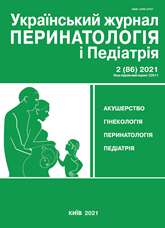Influence of biological and medico0social factors on the formation of schoolchildren's predisposition to negative behavior
DOI:
https://doi.org/10.15574/PP.2021.86.49Keywords:
adolescents, risk factors, health, psychological statusAbstract
Purpose — to identify environmental factors that influence on negative behavior in school-age adolescents.
Materials and methods. A survey of 256 adolescents in primary schools examined the health status, psychological state of the family and school. 337 adolescents were examined, 101 were at risk group, 80 were adolescent from social rehabilitation boarding schools and 156 were in control group to identify the reasons that prompted adolescents to behave negatively.
Results. We found decreased health indicators of adolescents from risk group, a psychological condition in their families was unsatisfactory in a large proportion of adolescents: 13.3% was nervous, 11% was depressed, 7.6% was anxious, 8.8% s aggressive. The same pattern was observed in school conditions — 26.5% of adolescents indicated anxiety-nervous state, 16.2% — depressed, 9.8% — aggressive. Depth researches of into the causes of adolescents' psychological deterioration and their tendency to negative behavior revealed a number of biological and medico-social factors, which include complications of delivery, that was found in the first year of life, raising children in the family, organizing schooling, the prevalence of harmful habits, unhealthy lifestyles and unfavorable family conditions (single-parent families, alcohol abuse parents, child neglect).
Conclusions. This study showed that adolescents who are prone to socio-negative behavior have a difficult history of life, a number of social and biological factors that adversely affect their health, psychological development and adaptation in society. To prevent this phenomenon it is necessary to create a state program of preventive education of young people, formation of the concept of healthy lifestyle for each teenager. Teens from families at risk group should be taken on special controls.
The research was carried out in accordance with the principles of the Helsinki declaration. The study protocol was approved by the Local Ethics Committee of an participating institution. The informed consent of the patient was obtained for conducting the studies.
No conflict of interest was declared by the authors.
References
Balakirieva OM, Pavlova DM, Nhuien N–MK, Levtsun OH, Pyvovarova NP, Sakovych OT, Fliarkovska OV. (2019). Kurinnia, vzhyvannia alkoholiu ta narkotychnykh rechovyn sered pidlitkiv, yaki navchaiutsia. URL: https://www.unicef.org/ukraine/espad2019_report.
Chorna VV. (2009). Vplyv kompiuternykh ihor na psykhofunktsionalnyi stan ditei. Dovkillia ta zdorovia. 1 (46): 54–58.
Fesenko AO, Stetsenko VP. (2021). Vplyv kompiutera na ditei ta pidlitkiv , ta poviazani z tsym konflikty. URL: https://informatika-ikt.at.ua/_fr/2/8758125.pdf.
Kocherov AV. (2018). Agressivnoe povedenie podrostkov kak faktor riska psihologicheskoy bezopasnosti obrazovatelnoy sredyi. Mezhdunarodnyiy nauchnyiy zhurnal. Innovatsionnoe razvitie. 1 (18): 87–90.
Kuznetsova A. (2021). Vliyanie sovremennyih tehnologiy na podrostkov pochti ne izmenilos s 90-h godov. URL: https://nplus1.ru/news/2021/05/05/technologies-menta-health.
Polka NS. (2009). Riven shkilnoi tryvozhnosti yak kryterii psykhoemotsiinoi adaptatsii do umov navchannia u zahalnoosvitnikh zakladakh riznykh typiv. Dovkillia zdorovia. 3 (50): 40–43.
Razdobarova OA. (2011). Prychyny y profylaktyka devyantnoho povedenyia podrostkov. URL: https://psyjournals.ru/addictive_behavior/issue/46099_full.shtml.
Shivtsov VV, Shivtsov AV. (2010). Faktoryi riska agressivnogo povedeniya podrostkov. Vestnik VEGU. 1 (45): 91–98.
Shkiriak–Nyzhnyk ZA, Horban NYe, Slobodchenko LM, Lapikura OV, Sliepakurova IV. (2020). Vplyv stresovykh sytuatsii u simi na formuvannia povedinky pidlitka. Aktualni pytannia pediatrii, akusherstva ta hinekolohii: 2.
WHO. (2020). Vsemirnaya Organizatsiya Zdravoohraneniya. Psihicheskoe zdorove podrostkov. URL: https://www.who.int/ru/news-room/fact-sheets/detail/adolescentmental-health.
Downloads
Published
Issue
Section
License
The policy of the Journal “Ukrainian Journal of Perinatology and Pediatrics” is compatible with the vast majority of funders' of open access and self-archiving policies. The journal provides immediate open access route being convinced that everyone – not only scientists - can benefit from research results, and publishes articles exclusively under open access distribution, with a Creative Commons Attribution-Noncommercial 4.0 international license(СС BY-NC).
Authors transfer the copyright to the Journal “MODERN PEDIATRICS. UKRAINE” when the manuscript is accepted for publication. Authors declare that this manuscript has not been published nor is under simultaneous consideration for publication elsewhere. After publication, the articles become freely available on-line to the public.
Readers have the right to use, distribute, and reproduce articles in any medium, provided the articles and the journal are properly cited.
The use of published materials for commercial purposes is strongly prohibited.

